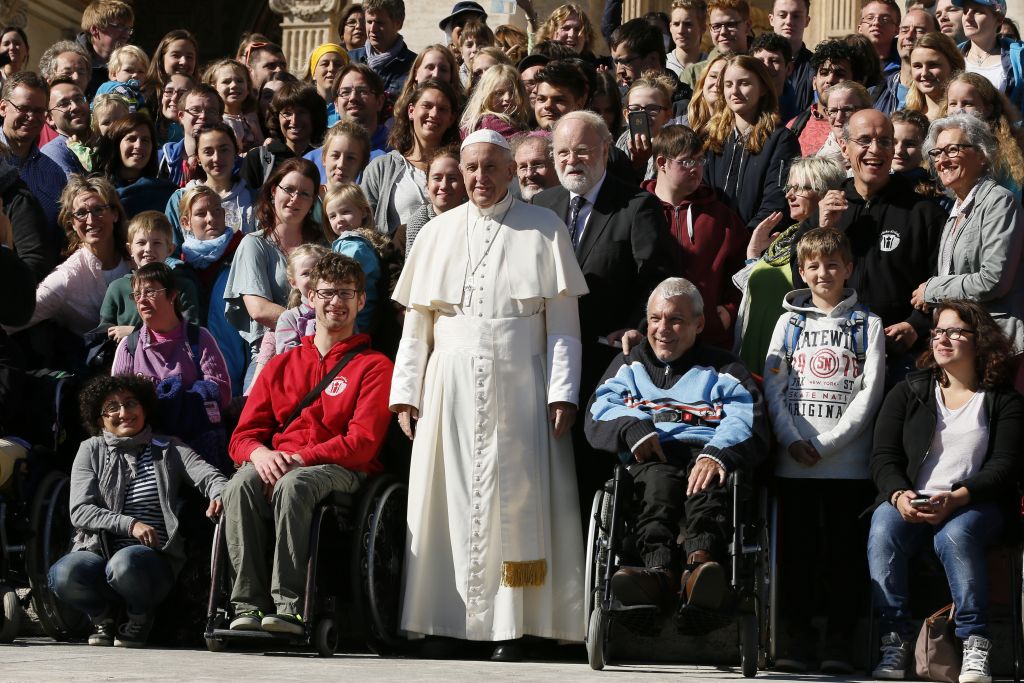Let’s dialogue and be bridge builders
Pope Francis spoke on Oct 22, at his special audience for the Jubilee Year of Mercy, before an assembled crowd of 100,000.
Nov 03, 2016

VATICAN: Pope Francis spoke on Oct 22, at his special audience for the Jubilee Year of Mercy, before an assembled crowd of 100,000.
“All forms of dialogue are an expression of the great need of love for God who reaches out to everyone and, in everybody, he puts a seed of his goodness, so that he or she can help in his creative work.”
Such dialogue “breaks down the walls of divisions and misunderstandings, builds bridges of communication, and does not allow anyone to turn inward into his or her world,” but “invites us to stand before others, seeing them as a gift of God.”
For the Pontiff, dialogue involves listening to and not abusing others. Dialogue is needed in every environment, from the family to society, to the Church. He was inspired by the passage in the Gospel of John that recounts Jesus’ encounter with a Samaritan woman. “What is striking about this meeting,” the Pope said, “is the close dialogue between the woman and Jesus. This now allows us to point out a very important aspect of mercy, which is, precisely, dialogue. Dialogue allows people to know and understand the needs of each other.
“First of all, it is a sign of great respect, because it puts people in an attitude of listening and in a position of incorporating the best aspects of their interlocutor. Secondly, dialogue is an expression of charity, because, whilst not ignoring differences, it can help one find and share the common good. In addition, dialogue invites us to stand before others, seeing him or her as a gift from God, who challenges us and asks us to be recognised.
“Many times, we do not meet our brothers and sisters even though we live close to them, especially when we impose our position on others. We do not engage in dialogue when we do not listen enough or tend to disrupt each other to prove ourselves right. But how many times, how many times, when we listen to someone, do we stop (and say), ‘No! No! It is not like that!’, and we do not let the person finish explaining what he or she wants to say. This prevents dialogue, this is aggression. Instead, true dialogue requires moments of silence to seize the extraordinary gift of the presence of God in one’s brother or sister.
“Dear brothers and sisters, dialogue helps people humanise relationships and overcome misunderstandings. There is so much need for dialogue in our families, and how much easier it would be to settle issues if we learnt to listen to each other! This is how it is in the relationship between husband and wife, and between parents and children. How much help can also come from dialogue between teachers and their pupils, or between managers and workers, to find out what is most needed in work?
“The Church, too, lives in dialogue with the men and women of every age, to understand the needs that are at the heart of every person and contribute to achieving the common good. Let us think of the great gift of creation and the responsibility we all have to protect our common home. Dialogue on such a central issue is an inescapable requirement. Let us think of the dialogue between religions, to discover the profound truth of their mission among men and women, and contribute to building peace and a network of respect and fraternity (cf. Laudato Si’, 201).
“Finally, all forms of dialogue are an expression of the great need of love for God who reaches out to everyone and, in everybody, puts a seed of his goodness, so that he or she can help in his creative work.
“Dialogue breaks down the walls of divisions and misunderstandings, builds bridges of communication, and does not allow anyone to turn inward into his or her world.
“Do not forget that dialogue is listening to what others tell me, and humbly saying what I think. If things went this way, the family, the neighbourhood, the workplace, would be better. But if I do not let others say everything that is in their heart and I start to shout — today there is a lot of shouting — the relationship between us will not succeed, the relationship between husband and wife, between parents and children, will not work. Listening, explaining, gently, not barking at each other, not shouting: open heart.
“Jesus knew well what was in the heart of the Samaritan woman, a great sinner; nevertheless, he did not prevent her from expressing herself; he let her speak until the end, and gradually entered into the mystery of her life. This teaching applies to us as well. Through dialogue, we can develop the signs of God’s mercy and make them tools of acceptance and respect.”--Asianews







Total Comments:0